国际法期末考试英文名词解释
国际法名词解释

国际法名词解释汇总一、国际公法名词解释1.Archipelagic sea lane passage群岛海道通过baseline直线基线economic zone专署经济区clause5.jus cogens强行法7.neutralized states中立国p.77/ sector principle扇形原则9.attaches附属国/添附10.natural prolongation principles自然延长原则11.pacta sunt servanda约定必须遵守批of effectiveness有效原则13.par in parem non habet jurisdictionem平等者之间无管辖权14.accretion添附sanguinis血统主义sic stantibus17.retortion报复18.extra territorial asylum领事庇护、域外庇护19.a delict jure genetium20.treaty-contracts21.international comity国际法院22.Drago Doctrine23.trust territories24.cession割让26.signature ad referendum暂签shelf大陆架Congress维斯特法利亚国会/立法会29.Diplomatic Corps外交团legation premises使馆(外交人员的经营场所)31.nuncios32.the peaceful co-existence principle和平共处原则34.Full Power全权证书35.change's daffaires36.exequatur37.letter of Credence国书;LiHaopei;ShiJiuyong;He Qizhi;Zhaolihai39.Caonnally w-making contract造法性条约41.Super-national Law超国法42.the right of collective self-defence集体自卫权43.jus non scriptum44.the nation's penal obligation国家刑事责任Usage/ International Custom国际习惯/国际惯例46.Instant International Customary Law47.persona non grata不受欢迎的人Treaty拉忒兰条约49.consular privileges and immunities领事人员特权与豁免p.263/外交特权与豁免control有效控制51. aut dedere aut punire 引渡或仲裁52. transit passage 过渡条款53. Sector Principle 扇形原则54. Asylum 庇护55. erga omnes obligations 各国对国际社会承担的责任56. Lauterpacht;Grotius;Austin 劳特派特、格老秀斯、奥斯汀58. opinio juris法律确信59. Optional Compulsory Jurisdiction60. Jus ad Bellum61. Extradition 引渡62. Environment Impact Assessment 环境影响评估(?)63. Double vote 双重否决64. High Seas公海65. Right of visit登临权66. Right of Hot Pursuit67. Transit Passage 通过权68. Parrallel Exploitation System平行开发制69. Prescription 时效70. Special Mission 特别使团解释并比较:1. de jure recognition / de facto recognition 法律承认/事实上的承认2. Good office / mediation / Conciliation斡旋/调停/协商、和解p.6363. Initialling / siganature ad referendum p.1984. Revision / Amendent / Modification修订/修正案/更改p.2135. territorial Asylum / extra-territorial Asylum域内庇护/域外庇护p.1406. Universal Jurisdiction / protective Jurisdiction普遍管辖权/保护性管辖权7. Right of self-preservation自保权p.798. rendition投降9. retorsion / reprisal 报复/报复性掳掠10. right of innocent passage / right of transit passage无害通过权/通过权p.31611. exequatur / letter of Credence12. authentication / signature 认证/签署p.19813. international delinquency14. indemnity / reparation二、国际私法名词解释1.Fraus Omnia Comunpit2.lex loci re sitae3.state immunity国家豁免权4.characteristic performance5.remission revoi一级反致6.Bustamante Code布斯塔曼特法典7.lex loci solutionis合同履行地法8.lex volutatis当事人合意选择的法律9.Bartoles巴托鲁斯10.Renvoi au second degre11.Migratory marriage12.Bona vacantia13.Interregional conflicts law区际法律冲突14.act jure gestionis15.putative marriage事实婚姻16.locus regit actum (in arbitration law)场所支配行为17.the proper law of the arbitration agreement仲裁协议所适用的准据法18.ana-national or denationalized approach开除国籍的手段19.jurisdiction concerning the jurisdiction (in arbitration law)20.the collected jurisdiction21.favor validitatis / ut res magis valeat quam pereat (in arbitration law)22.severability of arbitration clause可分离的仲裁条款23.the jurisdiction doctrine under internet circumstance在英特网环境下的管辖权原则24.pro-arbitration专家仲裁25.theory of Party-autonomic意思自治说26. law District 法律管辖权27. Amiable Arbitration28. Ad Hoc Arbitration29. rule of double actionability 双重可诉原则30. Mandatory rules 强制性规定30. domicile of choice 住所地的选择31. preliminary question 先决问题32. Inderect Renovi 间接反致33. lex causae34. lex loci delicti35. formula of attribution 归属的惯例36.Reese;Fuld;Cavers;Cook;Rabel;Dicey; Mancini:Beale;Savigny;Story;Huber ;Bartolus里斯、富德、卡弗斯、库克、拉沛尔、戴赛、孟西尼、?、萨维尼、施托里、胡伯、巴托鲁斯37. Severability of Arbitration Agreement 可分离的仲裁条款38. the collected jurisdiction of China middle court39. local law theory本国法学说40. Comitas Gentium41. bilateral conflict rules 双边冲突规范42. depecage43. lex arbitri 仲裁法44. Proper law doctrine 准据法原则三、国际经济法1.passing of Risk2.FCA或交承运人mechanism in WTO4.Cumulative assessmenternment Procurement6.Safeguard Measures保障措施value (in customs valuation)扣减价格8.the new development of WTOWTO 的新发展。
国际公法英文名解汇总纲目版

国际公法英文名解汇总纲目版第一章国际法导论International law 国际法Jus civile 市民法Jus gentium 万民法Jus inter gentes = law of nations 万国法/万国公法Positive morality 实在道德International comity 国际礼让Treaty on European Union = Treaty of Maastricht 《欧洲联盟条约》/《马斯特里赫特条约》Naturalists 自然法学派Solidarists 社会连带法学派Normativists 规范法学派Positivists 实在法学派Sources of law = sources du droit = fontes juris 法律渊源Monism 一元论Dualism 二元论第二章国际法基本原则Jus cogens 强行法/强制法/绝对法Sovereignty 主权The Right of People to Self-determination 民族自决权第三章国际法主体Single State 单一国Federation 联邦Confederation 邦联Protected State 被保护国Permanent Ueutralized State 永久中立国Fundamental Right 基本权利Secondary Rights 派生权利Right of Independence 独立权Right of Equality 平等权Right of Self-preservation 自保权Right of Jurisdiction 国家管辖权Territorial Jurisdiction 属地管辖权/属地优越权Personal Jurisdiction = nationality jurisdiction = active personality principle 属人管辖权/国籍管辖/积极国籍管辖Protective Jurisdiction = passive personality principle 保护性管辖权/消极国籍管辖Universal Jurisdiction 普遍性管辖权Judicial immunities 外国国家的司法豁免权Recognition 国际法上的承认Effective control 有效统治Succession 国际法上的继承第四章国际法上的居民Nationality 国籍Inhabitant 居民Original nationality 原始国籍/出生国籍Jus sanguinis 血统主义Jus soli 出生地主义Acquired nationality 因加入而取得国籍Naturalization 入籍/归化Release 放弃(国籍)Deprive 剥夺(国籍)Dual nationality 双重国籍Active conflicts 国籍的积极抵触Stateless person 无国籍人Passive conflicts 国籍的消极抵触Alien 外国人Deportation 驱逐出境National treatment = doctrine of equality of treatment = NT 国民待遇/平等待遇原则International standard of treatment “文明世界”的“国际标准”/“最低标准”Most favorable national treatment = MFNT 最惠国待遇Differential treatment 差别待遇Extradition 引渡Principle of Non-extradition of Political Offenders 政治犯不引渡原则Attentat clause = Assassination Clause 行刺条款/比利时行刺条款/暗杀条款Principle of identity 相同原则/罪名同一原则/双重犯罪原则Principle of speciality 罪行特定原则/罪名专用原则或专一原则Asylum 庇护Territorial asylum 领域庇护/域内庇护Extra-territorial asylum 域外庇护Refugee 难民Nansen passport 南森护照Convention refugees 公约难民Mandate refugees 章程难民Principle of non-refoulement 不推回原则/禁止驱逐、送还原则Diplomatic protection 外交保护Doctrine of continuous nationality 国籍连续原则Exhaustion of local remedies 用尽国内救济原则Calvo clause 卡尔沃条款Calvo doctrine 卡尔沃主义第五章国家法律责任International responsibility 国际法律责任/国际责任Primary rules 确定合法、非法的行为规则/是非规则/首要规则Secondary rules 国际法律责任规则/一般法律责任规则/责任规则/次级规则Distress 危难Necessity 危急情况Restitution 恢复原状Reparation 广义赔偿Compensation 狭义赔偿/经济赔偿Satisfaction 抵偿第六章领土法Land territory 领陆Territory W aters 领水Air space 领空Subsoil beneath state territory 底土Enclave 飞地Ownership 所有权Domination 统治权Condominium 共管Leased territory 租借International servitude 国际地役Internal waters 内水Internal rivers 内河Boundary rivers 界河Non-national rivers 多国河流International rivers 国际河流Inter-oceanic canals 通洋运河Occupation 先占/占领Vacant land 无主地Effective occupation 有效占领Prescription 时效Accretion 添附Cession 割让Conquest 征服Plebiscite 全民投票/全民公决Self-determination of peoples 民族自决The exchange of territory 交换领土Reversionary rights 收复失地Boundaries of state territory 国家边界第七章国际海洋法The common heritage of mankind 人类共同继承财产The United Nations Convention on the Law of the Sea 《联合国海洋法公约》Base line 基线Normal baseline 正常基线Straight baseline 直线基线Archipelagic baseline 群岛基线Innocent passage 无害通过Contiguous zone 毗连区/邻接区/海上特别区Exclusive economic zone 专属经济区Continental shelf 大陆架High seas 公海Flag of convenience 方便旗Right of visit 登临权/临检权Right of hot pursuit 紧追权Straits used for international navigation 用于国际航行的海峡Transit passage 过境通行Archipelagic waters 群岛水域Right of archipelagic sea lanes passage 群岛海道通过权International sea-bed area 国际海底区域Single exploitation system 单一开发制Parallel exploitation system 平行开发制第八章国际航空法Air defence identification zone = ADIZ 防空识别区/空中识别区Cabotage 国内载运权The International Civil Aviation Organization = ICAO 国际民用航空组织Dol = wilful misconduct (承运人的)加害行为/故意造成损害的不法行为/故意的行为/不在乎地不顾后果的行为Two tier liability “双梯度”责任制度/两级责任制Aut dedere aut judicare 或引渡或起诉原则Aut dedere aut punier 或引渡或处罚第九章外层空间法Outer space 外层空间第十章国际环境法Sustainable development 可持续发展Pollution from vessels 船舶污染Pollution by dumping 控制海洋倾倒Pollution from land-based sources 陆源污染第十一章外交关系法Consular provision 委任文凭Consular exequatur 领事证书第十三章国际条约法The Vienna Convention on the Law of Treaties《维也纳条约法公约》Treaty 条约Convention 公约Convention 专约Agreement 协定Protocol 议定书Final act 最后议定书/蒇事议定书Covenant 盟约Charter 宪章Statute 规约Exchange of Notes 换文Declaration 宣言Joint statement 联合声明Bilateral treaty 双边条约Multilateral treaty 多边条约Negotiation (条约)谈判Full power 全权证书Adoption 议定Authentication 认证Signature 签署Ratification 批准Accession 加入Reservation 保留Registration 登记Publication 公布Pacta sunt servanda 条约必须遵守原则Pacta tertiis nec nocent nec prosunt 约定对第三者既无损,也无益Termination 条约的终止Invalidation 条约的失效Suspension 条约的暂停施行/条约的中止/条约的停止施行Interpretation 条约的解释Revision 条约的修订Amendment 条约的修正Modification 条约的修改第十四章国际组织法International organization 国际组织Inter-governmental organization 政府间组织International institutional law 国际组织法Concert of Europe 欧洲协商Non-governmental organization 非政府间国际组织Organization of petroleum exporting countries = OPEC 石油输出机构/石油输出国组织Organization for economic cooperation and development = OECD 经济协力开发机构/经济合作与发展组织/经合组织General Assembly 联合国大会Security Council 安全理事会/安理会Economic and Social Council 经济与社会理事会/经社理事会Trusteeship Council 托管理事会International Court of Justice 国际法院Secretariat 秘书处Specialized International Organization 专门性国际组织Specialized Agencies 联合国专门机构International telecommunication union = ITU 国际电信联盟Universal postal union = UPU 万国邮政联盟W orld meteorological organization = WMO 世界气象组织W orld health organization = WHO 世界卫生组织International labour organization = ILO 国际劳工组织Food and Agriculture Organization of the United Nations = FAO 联合国粮食及农业组织/联合国粮农组织United Nations Educational,Scientific,and Cultural Organization = UNESCO 联合国教科文组织International monetary fund = IMF 国际货币基金组织International bank for reconstruction and development = IBRD 国际复兴开发银行/世界银行International civil aviation organization = ICAO 国际民用航空组织International finance corporation = IFC 国际金融公司International maritime organization = IMO 国际海事组织International development association = IDA 国际开发协会W orld intellectual property organization = WIPO 世界知识产权组织International fund of agricultural development = IFAD 国际农业发展基金(组织)United Nations Industrial Development Organization = UNIDO 联合国工业发展组织W orld trade organization = WTO 世界贸易组织International atomic energy agency = IAEA 国际原子能机构Collective security 集体安全保障Peace-keeping operations = PKO 联合国维持和平行动Regional organization 区域性国际组织Organization of American States = OAS美洲国家组织Arab League = League of Arab States = AL = LAS 阿拉伯国家联盟/阿拉伯联盟/阿盟African union = AU 非洲联盟/非盟Organization of African Unity = OAU 非洲统一组织/非统组织Association of Southeast Asian Nations = ASEAN 东南亚国家联盟/东盟European community = EC 欧洲共同体ECSC 欧洲煤钢共同体EUBATOM 欧洲原子能共同体EEC 欧洲经济共同体European union = EU 欧洲联盟Shanghai Cooperation Organization =SCO上海合作组织/上合组织Asian-Pacific Economic Cooperation organization = APEC 亚太经合组织第十五章国际人权法Human Rights 人权The responsibility to protect 保护的责任The Universal Declaration of Human Rights 《世界人权宣言》The International Covenant on Civil and Political Rights 《公民权利和政治权利国际公约》The International Covenant onEconomic,Social and Cultural Rights 《经济、社会和文化权利国际公约》第十六章国际刑法International criminal law 国际刑法International crimes 国际犯罪The direct enforcement model 直接执行模式The indirect enforcement model 间接执行模式International penal judicial assistance 国际刑事司法协助Extradition 引渡Principle of non-extradition of political offenders 政治犯不引渡原则Assassination Clause = Attentat clause 行刺条款/暗杀条款/比利时行刺条款Transfer jurisdiction of criminal procedure 刑事诉讼移管/刑事诉讼移转管辖Recognition and enforcement of foreign penal judgements 外国刑事判决的承认和执行International criminal jurisdiction 国际刑事管辖第十七章国际争端法International disputes 国际争端Legal disputes = justiciable disputes 法律性质的争端/可裁判的争端Political disputes = Non-justiciable disputes 政治性质的争端/不可裁判的争端Compulsive means 强制方法Negotiation 谈判Consultation 协商Good office 斡旋Mediation 调停International inquiry 国际调查/调查Conciliation 和解/调解Bryan peace treaties 《布赖恩和平条约》/冷却条约International arbitration 国际仲裁/国际公断Jay treaty 杰伊条约Permanent court of arbitration 常设仲裁法院Judicial settlement 司法解决The permanent court of international justice 常设国际法院International court of justice 国际法院Contentious jurisdiction 诉讼管辖权Optional compulsory jurisdiction 任意强制管辖Connally reservation 康纳利保留条款Advisory jurisdiction 咨询管辖权Regional agency = Regional arrangement 区域机关/区域办法第十八章战争法Law of war 战争法Law of armed conflict 武装冲突法Animo belligerendi 交战意向Jus ad bellum 诉诸战争权Suspension of arms 停战Surrender 投降International humanitarian law 国际人道法Crimes against humanity 违反人道罪W ar time neutrality 战时中立W ar neutrality law 战时中立法Permanent neutralized state 永久中立国/中立化国家W ar crimes 战争犯罪。
国际法期末总结
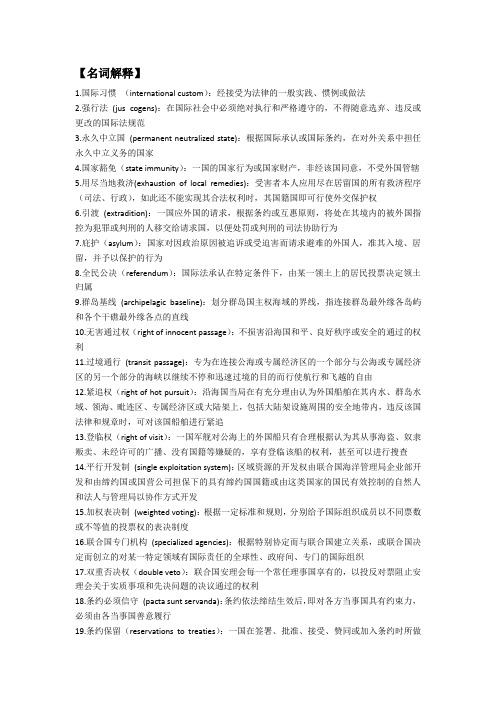
【名词解释】1.国际习惯(international custom):经接受为法律的一般实践、惯例或做法2.强行法(jus cogens):在国际社会中必须绝对执行和严格遵守的,不得随意选弃、违反或更改的国际法规范3.永久中立国(permanent neutralized state):根据国际承认或国际条约,在对外关系中担任永久中立义务的国家4.国家豁免(state immunity):一国的国家行为或国家财产,非经该国同意,不受外国管辖5.用尽当地救济(exhaustion of local remedies):受害者本人应用尽在居留国的所有救济程序(司法、行政),如此还不能实现其合法权利时,其国籍国即可行使外交保护权6.引渡(extradition):一国应外国的请求,根据条约或互惠原则,将处在其境内的被外国指控为犯罪或判刑的人移交给请求国,以便处罚或判刑的司法协助行为7.庇护(asylum):国家对因政治原因被追诉或受迫害而请求避难的外国人,准其入境、居留,并予以保护的行为8.全民公决(referendum):国际法承认在特定条件下,由某一领土上的居民投票决定领土归属9.群岛基线(archipelagic baseline):划分群岛国主权海域的界线,指连接群岛最外缘各岛屿和各个干礁最外缘各点的直线10.无害通过权(right of innocent passage):不损害沿海国和平、良好秩序或安全的通过的权利11.过境通行(transit passage):专为在连接公海或专属经济区的一个部分与公海或专属经济区的另一个部分的海峡以继续不停和迅速过境的目的而行使航行和飞越的自由12.紧追权(right of hot pursuit):沿海国当局在有充分理由认为外国船舶在其内水、群岛水域、领海、毗连区、专属经济区或大陆架上,包括大陆架设施周围的安全地带内,违反该国法律和规章时,可对该国船舶进行紧追13.登临权(right of visit):一国军舰对公海上的外国船只有合理根据认为其从事海盗、奴隶贩卖、未经许可的广播、没有国籍等嫌疑的,享有登临该船的权利,甚至可以进行搜查14.平行开发制(single exploitation system):区域资源的开发权由联合国海洋管理局企业部开发和由缔约国或国营公司担保下的具有缔约国国籍或由这类国家的国民有效控制的自然人和法人与管理局以协作方式开发15.加权表决制(weighted voting):根据一定标准和规则,分别给予国际组织成员以不同票数或不等值的投票权的表决制度16.联合国专门机构(specialized agencies):根据特别协定而与联合国建立关系,或联合国决定而创立的对某一特定领域有国际责任的全球性、政府间、专门的国际组织17.双重否决权(double veto):联合国安理会每一个常任理事国享有的,以投反对票阻止安理会关于实质事项和先决问题的决议通过的权利18.条约必须信守(pacta sunt servanda):条约依法缔结生效后,即对各方当事国具有约束力,必须由各当事国善意履行19.条约保留(reservations to treaties):一国在签署、批准、接受、赞同或加入条约时所做的片面声明,目的在于排除或更改条约中若干规定对该国适用时的法律效果20.任择性强制管辖(optional compulsory jurisdiction):国家随时做出单方面声明,就与接受同样义务的其他国家发生的某些法律争端,承认国际法院的强制管辖权,而不需要另行订立特别条约21.反报(retorsion):一国对另一国不礼貌、不友好的行为以同样类似的行为回应,针对的是不友好而非不法行为22.斡旋(good offices):第三者不介入具体争端,主要运用外部手段促使当事国从事谈判以解决争端23.外交团(diplomatic corps):各国驻同一国的外交代表机关馆长及其外交人员的总称24.国家继承(succession of State):一国有领土变更的法律实施,其在国际法上的权利义务依法转移给其他国家【简答题】1.简述国际法的渊源概念:国际法是由一系列调整国际关系的原则、规则和制度组成的,这些原则、规则和制度第一次出现的地方或最初的表现形式就是国际法的渊源。
国际法名词解释
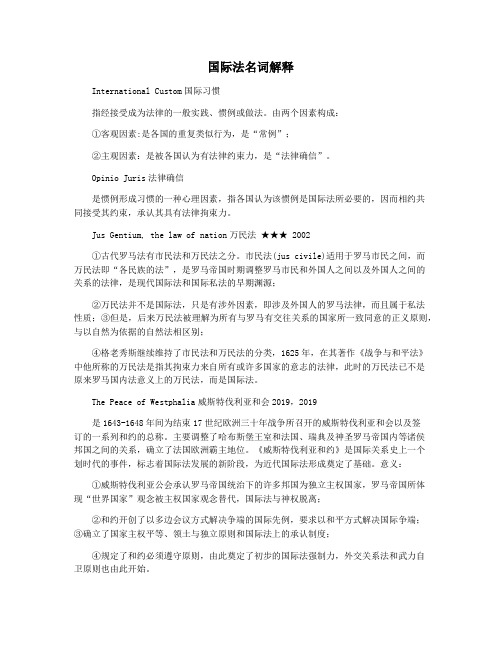
国际法名词解释International Custom国际习惯指经接受成为法律的一般实践、惯例或做法。
由两个因素构成:①客观因素:是各国的重复类似行为,是“常例”;②主观因素:是被各国认为有法律约束力,是“法律确信”。
Opinio Juris法律确信是惯例形成习惯的一种心理因素,指各国认为该惯例是国际法所必要的,因而相约共同接受其约束,承认其具有法律拘束力。
Jus Gentium, the law of nation万民法★★★ 2002①古代罗马法有市民法和万民法之分。
市民法(jus civile)适用于罗马市民之间,而万民法即“各民族的法”,是罗马帝国时期调整罗马市民和外国人之间以及外国人之间的关系的法律,是现代国际法和国际私法的早期渊源;②万民法并不是国际法,只是有涉外因素,即涉及外国人的罗马法律,而且属于私法性质;③但是,后来万民法被理解为所有与罗马有交往关系的国家所一致同意的正义原则,与以自然为依据的自然法相区别;④格老秀斯继续维持了市民法和万民法的分类,1625年,在其著作《战争与和平法》中他所称的万民法是指其拘束力来自所有或许多国家的意志的法律,此时的万民法已不是原来罗马国内法意义上的万民法,而是国际法。
The Peace of Westphalia威斯特伐利亚和会2019,2019是1643-1648年间为结束17世纪欧洲三十年战争所召开的威斯特伐利亚和会以及签订的一系列和约的总称。
主要调整了哈布斯堡王室和法国、瑞典及神圣罗马帝国内等诸侯邦国之间的关系,确立了法国欧洲霸主地位。
《威斯特伐利亚和约》是国际关系史上一个划时代的事件,标志着国际法发展的新阶段,为近代国际法形成奠定了基础。
意义:①威斯特伐利亚公会承认罗马帝国统治下的许多邦国为独立主权国家,罗马帝国所体现“世界国家”观念被主权国家观念替代,国际法与神权脱离;②和约开创了以多边会议方式解决争端的国际先例,要求以和平方式解决国际争端;③确立了国家主权平等、领土与独立原则和国际法上的承认制度;④规定了和约必须遵守原则,由此奠定了初步的国际法强制力,外交关系法和武力自卫原则也由此开始。
上海海事大学国际法期末考试整理解读

mon but Differentiated Responsibilities 共同但有区别的责任原则(名词解释)共同的责任是指由于地球生态环境的整体性,各国对保护全球环境都负有共同的责任,都应该参与全球环境保护事业。
有区别的责任是指由于各国经济和社会发展水平不同,废弃物和污染物的排放数量也不同,技术能力和工艺水平也不同,不应该要求所有国家承担完全相同的责任。
举例:光污染High technology2.Selected Contemporary Developments 国际环境法的最新发展A. The Role of Non-State Actors非政府行动者所扮演的角色B. Sustainable Development: purporting to reconcile environment and development可持续发展:即协调环境与发展C. Intergenerational Equity代际公平D. The Environment, Human Rights and Humanitarian Law环境,人权和人道主义法E. The Precautionary Principle 风险预防原则F. Environmental Impact Assessment环境影响评价G. Common but Differentiated Responsibilities 承担共同但有差别的责任H. Polluter Pays Concept 污染者自付概念3. 两次环境大会(1)1972年斯德哥尔摩人类环境大会;(2)1992年里约环境发展大会4. The notion of “generations” of rights三代人权1. First generation rights2. Second generation rights3. Third generation rightsa. Right to environmentb. Right to peacec. Right to development5. 联合国最重要的三部保护人权公约:《世界人权宣言》、《经济、社会和文化权利国际公约》和《公民权利和政治权利国际公约》6. 人权保护机构:第一,人权理事会(Human Rights Council)理事会系联大附属机构,由47个成员国组成,遵循公平地域分配原则,理事会成员由联大秘密投票选举产生,必须获半数以上会员国支持才能当选,任期3年,只能连选连任一届。
国际私法名词解释编

一、名词解释题1、准据法:(lex causae 或applicable law)是指经冲突规范指引用来具体确定国际民商法律关系当事人的权利与义务的特定法域的实体法律。
2、承认与执行外国法院判决:是指一国法院基于国际条约或互惠原则,根据外国法院或有关当事人的请求或申请,依法承认和执行他国法院就某一国际民商事案件所作出的判决。
3、法律冲突(conflict of laws):在国际法私法上,主要是指民商事法律的国际冲突,即涉及两个或两个以上不同法域的民商事法律对某一民商事关系的规定各不相同,而又竞相要求适用于该民商事关系,从而造成的该民商事关系在法律适用上的抵触现象,即适用所涉各法域互有差异的实体民商法规范,会得出不同的判决结果的现象。
4、系属公式(formula of attrbuion):又叫准据法表述公式,就是把一些解决法律冲突的规则习惯化,使它成为国际上公认的处理原则,大多数国家采用它来解决同类性质的法律关系的法律适用问题。
5、直接适用的法:各国国内法中那些直接适用于国际民商事法律关系的实体规范。
6、国际贸易惯例:国际民商事主体在长期商业实践基础上反复适用而形成的习惯性做法,它们只有经当事人约定于合同中,才具有法律约束力。
7、巴托鲁斯:(Bartolus)14世纪意大利法则区别说的代表人物,他法学声望极高,被称为“法律之光”。
他在总结前人探索的基础上,将法则分为人法、物法和混合法。
他抓住法律的域外效力和域内效力这一关键,提出了各城邦国家交往中的两个普遍法律问题:即一个城邦国家的法则是否可以适用于非本城邦居民;一个城邦国家的法则是否可以适用于该城邦国家领域之外。
8、杜摩兰(Charles Dumoulin):法国法则区别说的代表人物。
他继承和发扬了意大得法则区别说,主张限制封建属地主义,削减宗教法庭权力,加强中央权力,统一全国法律。
他在《巴黎习惯法评述》一书中指出在契约关系中,应该适用当事人自主选择的习惯法。
国际法名词解释&简答

名词解释::国际法是指在国际交往中形成的,主要调整国家间关系的,有法律拘1.International Law束力的原则、规则和制度的总体。
:国际法作为有效法律规范所形成的方式或程序。
2.Sources of international law:各国在反复实践中形成的,具有法律约束力的不成文的行为规则。
3.International Customage:又称常例或惯例,指各国对某种事项长期重复地采取的类似行为。
5.Jus cogens:也称绝对法、强制法,指必须绝对执行的法律规范。
:国家在相互关系中,不得以任何借口6.The principle of non-interference in internal affairs或任何方式直接或间接地干涉在本质上属于任何国家国内管辖之事件,也不得以任何手段强迫他国接受自己的意志、社会制度和意识形态。
7.Aggression:侵略是指一个国家使用武力侵犯另一个国家的主权、领土完整或政治独立。
:具有直接享受国际法上权利和承担国际法上义务的能力的国8.Subject of international law际法律关系的独立参加者。
(三个条件):单一国是由若干行政区域构成的统一主权的国家。
9.Unitary State10. Composite states:复合国是两个以上国家的联合体。
:联邦也称联邦国家,是两个以上的联邦成员国组成的国家联合。
11. Federal states:邦联是两个以上主权国家为了某种特定的目标根据国际条约组成的12. Confederated states国家联合。
:独立国是指行使全部主权的国家。
13. Independent states14. Dependent states:由于封建统治残余关系或者由于帝国主义、殖民主义的外来压力,对他国居于从属地位,因而只享受部分主权的国家。
:永久中立国是根据国际承认或国际条约,在对外关系中承15. Permanent neutralized state担永久中立义务的国家。
国际法名词解释

1.国际法(international law),是指在国际交往中形成的,主要用以调整国家间关系的,具有法律约束力的原则、规则和制度的总体。
2.国际法相对于国内法的特征:①社会基础②法律主体:国际法的主体主要是国家,主要调整国家之间关系的原则、规则和制度。
而国内法主要调整一国之内个人与个人之间或者国家与个人之间的关系,国内法的主体主要是个人③创制方式:国际法是由国际社会的国家以明示的同意或者默示的同意共同确认的。
而国内法规范是由一个国家单独创制的,由单个国家的专门立法机构予以制定或认可的④实施机制:国际法的执行主要靠国家的自我遵守,而不是靠国家之上的强制执行机关来维护。
而在国内社会,其权力集中于国家,国内法主要依靠有组织的国家强制机关,如军队、警察和法庭等加以维护,并保证国内法的实施3.国际法是否作为法律为各国所遵守①世界各国政府毫无例外地都承认国际法是对国家有拘束力的法律。
②在国际关系中,国际法的原则、规则和制度事实上总是得到各国的遵守。
③国际法遭到破坏的情况只是少数例外,违反者不仅要承担法律责任,而且还可能受到法律制裁。
4.国际法的渊源,一般指国际法规范第一次出现的地方,亦指国际法规范的创制方式或表现形式(1)国际习惯,指各国在实践中形成的有法律约束力的、不成文的行为规则。
构成要素:①物质要素——通例之存在:时间上的持续性;空间上的广泛性;方式上的一致性②心理要素:经接受为法律国际习惯的优势和局限优势:普遍适用性局限:形成的缓慢性和内容的不确定性(2)国际条约:指国际法主体之间以国际法为准则而缔结的、确立其相互间权利义务关系的书面协议。
①一般条约和特别条约②造法性条约和契约性条约③制定新的国际法规则的条约和对习惯国际法规则加以编纂的条约(3)一般法律原则:各国法律体系所共有的原则此外,司法判例、权威公法学家的学说、国际组织的决议5.国际法主体,是指具有直接享受国际法上权利和承担国际法上义务能力的国际法律关系的独立参加者。
国际私法英文名词解释

1、actions in personal:对人诉讼。
只要有关案件的被告在诉讼开始时在内国境内且能有效地将传票送达给被告,内国法院就有权对案件行使管辖权,而不管被告具有何国国籍,其住所或贯常居所处在何国境内,也不问有关案件在哪国发生。
对法人只要该法人在内国有商业活动。
2、actions in rem:对物诉讼。
以物(财产)为诉讼对象,他不像对人诉讼那样要求法院加给被告人以责任和义务,而是要求法院确定某项财产的所有权或其他权利,这种诉讼判决的效力及于第三人。
在这种诉讼中,法院可能对被告没有管辖权,他对某物有管辖权,即在送达诉讼文书时,该物在管辖区内。
3、attribution:系属formula of attribution:系属公式,使冲突规范的系属公式化,成为固定的系属,用于解决同类性质的涉外民事关系的法律适用问题。
这种公式化,固定化的系属就叫系属公式。
4、autonomy of will; autonomie de le volonte:意思自治原则,杜摩林,选法时当事人自己做出选择,提倡法律统一。
5、characteristic performance:特征性履行。
瑞士吉施尼策尔。
双务合同中,交付货物或提供劳动等给付是特征性给付。
决定合同的准据法应依特征性履行为准。
但决定合同的准据法不应以特征性给付的履行地为准,而以负担特征性履行给付义务的当事人的住所地或惯常地为准。
6、comitas gentium:国际礼让说,荷兰胡伯,解决法律冲突三原则,1、绝对效力,仅限于主权范围内;2、境内人适用;3、对在外国已取得的权利给予尊重。
7、commissioner:特派员取证。
法院在审理涉外民商事案件时委派专门人员去外国境内提取证据的行为。
8、冲突规范的种类:(1)unilateral conflict rules:单边冲突规范。
直接指定适用某国法律。
(2)bilateral conflict rules:双边冲突规范。
[2024版]国开电大法学本科《国际法》历年期末考试名词解释题题库
![[2024版]国开电大法学本科《国际法》历年期末考试名词解释题题库](https://img.taocdn.com/s3/m/b09425b5951ea76e58fafab069dc5022aaea46eb.png)
国开电大法学本科《国际法》历年期末考试题库第四大题,名词解释题题库说明:课程《国际法》即《国际公法》;资料整理于2024年3月,涵盖2007年7月至2024年1月国开电大期末纸质考试的全部试题及答案;适用于2024年7月国开电大法学本科学员期末纸质考试。
首字音序B不干涉内政原则:是指任何国家或者国家集团不得以军事、政治、经济或者任何其他手段干涉他国内政。
它是国际关系民主化、法制化及发展各国友好关系的前提,也是国家主权平等、独立原则的引申。
因为内政属于国家主权内的管辖事项,即纯属一国主权管辖的或国家享有最终决定权的,不涉及国际义务的事项。
保护性管辖权:一般是国家为了保险其安全、独立和利益,而对外国人在该国领城之外对该国国家或国民之犯罪行为实行管辖的权力。
庇护:国际法上庇护的一般意义是指国家对于因政治原因被追诉或遭迫害而请求避难的外国人,准其入境、居留和给予保护。
边界:是确定国家领土范围的界限,是划分一国领土与他国领土,一国领土与公海或专属经济区以及一国领空与外层空间的界线。
言字音序D大陆架:是指沿海国的陆地领土在该国领海之外的全部自然延伸,扩展到大陆边缘的海底区域的海床和底土。
大陆架的宽度从测算领海宽度的基线量起不足200海里的可延长到200海里,但不得超过350海里或不超过2500公尺等深线100海里。
登临权:是指军舰在公海上对于有合理依据认为外国船舶(享有完全外交豁免权的除外)有从事海盗行为、奴隶贩运、从事未经许可的广播、没有国籍或虽然悬挂外国旗帜或拒不展示其旗帜、而事实上却与该军舰属同一国籍的嫌疑时,可命令该船舶停船并派人登临和检查的权利。
首字音序F发射国:是指发射或促使发射空间物体的国家和从其领土或设施发射空间物体的国家。
国家不仅要对其本身发射的空间物体造成损害承担责任,而且对其控制下的非政府实体,如私人企业、团体发射的空间物体造成的损害也要承担责任。
§字音序G国籍:是指个人作为某一特定国家的成员而隶属于该国的一种法律资格或身份。
国际法考试名词解释

国际法考试名词解释名词解释国书是派遣国国家元首致接受国国家元首的正式文件,用以证明大使或公使的身份。
草签是指条约在正式签署前,表明全权代表对条约的约文已认证,但不表明接受条约拘束的签字。
群岛水域是指群岛基线内的水域。
先占又称占领,指一国有意识地占有无主地,并取得对它的主权的行为。
地方化债务是指以国家名义所借但用于国家领土的某一部分的债务,属于国家继承的范围。
国际法是主要调整国家之间关系的有法律约束力的原则、规则和制度的总体。
附庸国是指在对内事务上有自主权,但对外关系完全或主要地由宗主国行使的国家。
最惠国待遇是指一国(施惠国)给予另一国(受惠国)的国民(或法人)的待遇,不低于现在或将来给予任何第三国国民(或法人)在该国所享受的待遇。
内水是指一国领海基线内的一切水域。
它包括一国的港口、海湾和海峡以及领海基线与海岸之间的海域。
国际法律责任是指国际法对其国际不法行为或其他损害行为所应承担的法律责任。
国际法主体又称“国际法律人格者”,或简称“国际人格者”,它是指能够直接享受国际法上的权利和承担国际法上的义务,有能力独立参加国际法律关系的实体。
难民是指因种族、宗教、国籍、特殊社会团体成员或政治见解,而有恐惧被迫害的正当理由,置身在原籍国领域外不愿或不能返回原籍国或受该保护的人。
所谓登临权,又称临检权,是指一国的军舰在公海上对于有合理根据被认为犯有国际罪行或其他违反国际法行为嫌疑的商船,有登临和检查的权利。
反措施是指受害国针对一国际不法行为的责任不履行国家责任条款规定的法律后果而采取的措施,以促使责任国履行其国际义务。
平时封锁是指在和平时期,一国或数国以军事力量阻止船舶进出他国的港口或海岸,以迫使被封锁国满足封锁国有关争端解决的要求。
国际法基本原则是指那些被各国公认的、具有普遍意义且构成国际法基础的法律原则。
引渡是指一国应外国的请求,把正处在自己领土之内而受到该外国通缉或判刑的人,移交给外国审判或处罚的行为。
(完整word版)国际法期末题答案整理
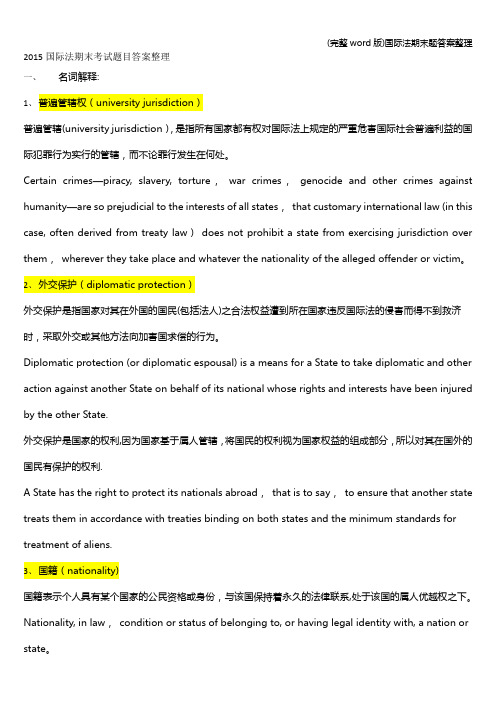
2015国际法期末考试题目答案整理一、名词解释:1、普遍管辖权(university jurisdiction)普遍管辖(university jurisdiction),是指所有国家都有权对国际法上规定的严重危害国际社会普遍利益的国际犯罪行为实行的管辖,而不论罪行发生在何处。
Certain crimes—piracy, slavery, torture,war crimes,genocide and other crimes against humanity—are so prejudicial to the interests of all states,that customary international law (in this case, often derived from treaty law)does not prohibit a state from exercising jurisdiction over them,wherever they take place and whatever the nationality of the alleged offender or victim。
2、外交保护(diplomatic protection)外交保护是指国家对其在外国的国民(包括法人)之合法权益遭到所在国家违反国际法的侵害而得不到救济时,采取外交或其他方法向加害国求偿的行为。
Diplomatic protection (or diplomatic espousal) is a means for a State to take diplomatic and other action against another State on behalf of its national whose rights and interests have been injured by the other State.外交保护是国家的权利,因为国家基于属人管辖,将国民的权利视为国家权益的组成部分,所以对其在国外的国民有保护的权利.A State has the right to protect its nationals abroad,that is to say,to ensure that another state treats them in accordance with treaties binding on both states and the minimum standards for treatment of aliens.3、国籍(nationality)国籍表示个人具有某个国家的公民资格或身份,与该国保持着永久的法律联系,处于该国的属人优越权之下。
国际法英文名词解释
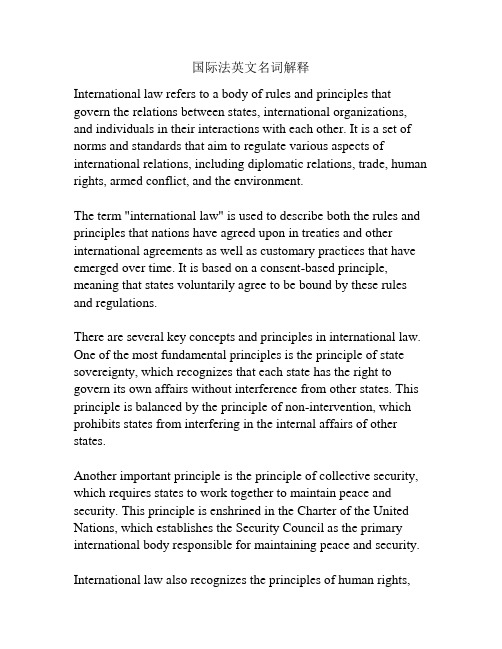
国际法英文名词解释International law refers to a body of rules and principles that govern the relations between states, international organizations, and individuals in their interactions with each other. It is a set of norms and standards that aim to regulate various aspects of international relations, including diplomatic relations, trade, human rights, armed conflict, and the environment.The term "international law" is used to describe both the rules and principles that nations have agreed upon in treaties and other international agreements as well as customary practices that have emerged over time. It is based on a consent-based principle, meaning that states voluntarily agree to be bound by these rules and regulations.There are several key concepts and principles in international law. One of the most fundamental principles is the principle of state sovereignty, which recognizes that each state has the right to govern its own affairs without interference from other states. This principle is balanced by the principle of non-intervention, which prohibits states from interfering in the internal affairs of other states.Another important principle is the principle of collective security, which requires states to work together to maintain peace and security. This principle is enshrined in the Charter of the United Nations, which establishes the Security Council as the primary international body responsible for maintaining peace and security. International law also recognizes the principles of human rights,which provide protections for individuals and groups from discrimination, torture, and other abuses. These principles are set out in a number of international treaties, including the Universal Declaration of Human Rights and the International Covenant on Civil and Political Rights.The enforcement of international law is a complex and multifaceted process. While states are primarily responsible for complying with and enforcing international law, there are also international courts and tribunals that help to ensure compliance. The International Court of Justice, for example, is the principal judicial organ of the United Nations and is responsible for settling legal disputes between states.Additionally, international law provides for the use of peaceful means to resolve conflicts, including negotiation, mediation, and arbitration. When peaceful means are not successful, states may resort to the use of force in self-defense or with the authorization of the United Nations Security Council.In recent years, the field of international law has expanded to include non-state actors, such as international organizations and individuals. International organizations, such as the United Nations and the World Trade Organization, play an increasingly important role in shaping and enforcing international law. Individuals can also be held accountable for serious international crimes, such as genocide and war crimes, through international tribunals like the International Criminal Court.In conclusion, international law is a complex and evolving fieldthat seeks to regulate the interactions between states, international organizations, and individuals. It is based on a set of rules and principles that aim to preserve peace, protect human rights, and promote cooperation among nations.。
国际法名词解释
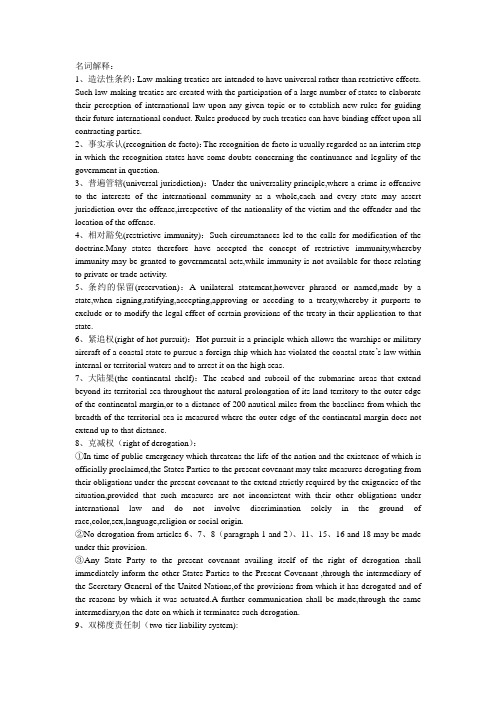
名词解释:1、造法性条约:Law-making treaties are intended to have universal rather than restrictive effects. Such law-making treaties are created with the participation of a large number of states to elaborate their perception of international law upon any given topic or to establish new rules for guiding their future international conduct. Rules produced by such treaties can have binding effect upon all contracting parties.2、事实承认(recognition de facto):The recognition de facto is usually regarded as an interim step in which the recognition states have some doubts concerning the continuance and legality of the government in question.3、普遍管辖(universal jurisdiction):Under the universality principle,where a crime is offensive to the interests of the international community as a whole,each and every state may assert jurisdiction over the offense,irrespective of the nationality of the victim and the offender and the location of the offense.4、相对豁免(restrictive immunity):Such circumstances led to the calls for modification of the doctrine.Many states therefore have accepted the concept of restrictive immunity,whereby immunity may be granted to governmental acts,while immunity is not available for those relating to private or trade activity.5、条约的保留(reservation):A unilateral statement,however phrased or named,made by a state,when signing,ratifying,accepting,approving or acceding to a treaty,whereby it purports to exclude or to modify the legal effect of certain provisions of the treaty in their application to that state.6、紧追权(right of hot pursuit):Hot pursuit is a principle which allows the warships or military aircraft of a coastal state to pursue a foreign ship which has violated the coastal state’s law within internal or territorial waters and to arrest it on the high seas.7、大陆架(the continental shelf):The seabed and subsoil of the submarine areas that extend beyond its territorial sea throughout the natural prolongation of its land territory to the outer edge of the continental margin,or to a distance of 200 nautical miles from the baselines from which the breadth of the territorial sea is measured where the outer edge of the continental margin does not extend up to that distance.8、克减权(right of derogation):①In time of public emergency which threatens the life of the nation and the existence of which is officially proclaimed,the States Parties to the present covenant may take measures derogating from their obligations under the present covenant to the extend strictly required by the exigencies of the situation,provided that such measures are not inconsistent with their other obligations under international law and do not involve discrimination solely in the ground of race,color,sex,language,religion or social origin.②No derogation from articles 6、7、8(paragraph 1 and 2)、11、15、16 and 18 may be made under this provision.③Any State Party to the present covenant availing itself of the right of derogation shall immediately inform the other States Parties to the Present Covenant ,through the intermediary of the Secretary-General of the United Nations,of the provisions from which it has derogated and of the reasons by which it was actuated.A further communication shall be made,through the same intermediary,on the date on which it terminates such derogation.9、双梯度责任制(two-tier liability system):For damages arising not exceeding 113,000 Special Drawing Rights for each passenger,the carrier shall not be able to exclude or limit its liability.The carrier shall not be liable for damages arising exceed for each passenger 113000 Special Drawing Rights if the carrier proves that:(a) such damage was not due to the negligence or other wrongful act or omission of the carrier or its servants or agents;or (b) such damage was solely due to the negligence or other wrongful act or omission of a third party.简答论述:一:法律承认的法律效力:1、Full diplomatic relations could be established between the recognizing state and the recognized entity.Treaties on a general topic could be concluded.2、Enjoy locus standi in the recognizing state enjoy immunity from suit in the recognizing state and can not be sued without it consent.3、Its legislative and administrative acts will be given effect to within the recognizing state De jure authority remain competent for matters arising outside that territory.4、Recognition once granted is retroactive.it is backdated to the establishment of the entity in question and it does not related the time recognition is accorded.。
国际法名词解释

1、国际法(International Law/Law of Nations):——调整国际关系(其中主要是国家之间的关系)的有法律约束力的法律规范的总称。
2、“三十年战争”(1618-1648)和“威斯特伐利亚和约”(Peace of Westphalia),标志着真正意义上的国际法的产生(近代国际法诞生的标志,承认国家主权和平等的国际法主体地位。
3、国际法主体:有能力享有国际法上的权利和承担国际法上的义务,并有能力开展国际关系活动的实体。
4、国际法的渊源:国际法全部规范的权威和效力来源及其产生的形式和过程。
5、国际条约:国际法主体之间缔结的规定相互间权利义务关系的协议或约定(规范性文件)6、国际习惯:被国际上公认的并当作一般法律信念遵守的经接受为一般实践、惯例或做法。
7、一般法律原则:被文明各国所接受的一般性本源性原理(国内法说和国际法说)&各国国内法共通的法律原则8、司法判例与国际法学者的学说:9、公允及善良原则:即在公平和善意基础上,不严格依照国际法进行裁判,但必须得到当事方各国的同意。
10、国际“软法”(soft law):原则上不具有法律约束力,但能产生一定法律效果的国际文件。
11、“国际法的逐渐发展”:就国际尚未订立规章或各国惯例尚未充分发展成法律的各项主题,拟订公约草案。
12、“国际法的编撰”:更精确地制订并系统整理广泛存在国家惯例、判例和学说的国际法规则。
13、二元论:国际法与国内法是两个互不相同、各自独立、平行运作的法律体系。
14、国际法基本原则:是指那些被各国公认和接受的、具有普遍约束力的、适用于国际法各个领域的、构成国际法基础的法律原则。
15、国际强行法:“国家之国际社会全体接受并公认为不许损抑且仅有以后具有同等性质之一般国际法规律始得更改之规律”16、“主权”:国家的根本属性,国家独立自主地处理其内外事务而不受外来干涉的权力17、国际组织的定义:广义:若干国家或政府,以及民间团体或个人,基于国际合作的目的而创立的常设性机构。
国际法名词解释

国际法international law 或称国际公法public international law p1 法律确信opinion juris p13一般承认ageneral recognition p13国际法的编纂codification p16国际法的效力根据the basis of international law p19条约必须信守原则pactasunt servanda p25属人/地最高权territorial/personal supremacy p31主权平等sovereign equality p33国家state p34永久性人口permanent population p34领土territory p35主权sovereignty p35单一国unitary state p36复合国composite state p36联邦federation p36邦联confederation p37永久中立国permanent neutralized state p37国家的基本权利fundamental rights p40独立权right of independence p40平等权right of equality p41自卫权right of self-defence p41管辖权right of jurisdiction p42属地管辖权territorial jurisdiction p42属人管辖权personal jurisdiction p42保护性管辖protective jurisdiction p43普遍管辖universal jurisdiction p44国家豁免state immunity p44国家的承认recognition of state p48法律的承认de jure recognition p52事实的承认de facto recognition p52政府的承认recognition of government p53有效统治原则principle of effectiveness p53民族解放组织的承认recognition of national movement p54叛乱团体insurgent body p54交战团体belligerent body p54国家的继承succession of state p55白板规则the clean plate rule p57国家财产state property p58国家债务state debt 又称公共债务public debt p59地方化国家债务localized state debt p59政府继承succession of government p60国籍nationality p64外国人alien p72国民待遇national treatment p75最惠国待遇most favoured nation treatment p75互惠待遇reciprocal treatment p76外交保护diplomatic protection p76实际国籍effective nationality p77国际持续原则doctrine of continuous nationality p77引渡extradition p81符合相同原则principle of identity p83特定原则principle of specialty p84庇护asylum p85难民refugee p90不推回原则non-refoulement p93国家领土state territory p95领土主权territorial sovereignty p95共管condominium p97租借leased territory p98国际地役international servitude p98领陆land territory p100领水territorial waters p100内水internal waters p100界河boundary river p100多国河流multi-national river p101国际河流international river p101湖泊或内陆海lake or inland sea p102通洋运河inter-oceanic canal p102领海territorial sea p104领空territorial airspace p104底层领土territorial subsoil p104先占occupation p105无主地terra nullius p105时效prescription p106添附accretion p106割让cession p107征服conquest p108民族自决self-determination of peoples p108全民公决referendum p109国家边界state boundary p109边境frontier region p110承认现状原则或保持占有原则the principle of uti possidetis juris p112 国际海洋法the international law of the sea p124内水internal waters p129海湾bays p129港口ports p130领海the territorial sea p130领海基线baseline p131无害通过权right of innocent passage p132毗连区contiguous zone p133用于国际航行的海峡straits used for international navigation p134群岛水域archipelagic waters p136群岛海道通过权right of archipelagic sea lanes passage p136和平通过权peaceful crossing right p137过境通过权transit crossing right p137专属经济区the exclusive economic zone p138大陆架continental shelf p141公海high seas p145登临权right of visit p149紧追权right of hot pursuit p150航空法air law p156领空territorial airspace p161过境通过权transit crossing right p169群岛海道通过权right of archipelagic sea lanes passage p169拦截interception p169业务权又称航权traffic right p1751、外层空间法(outer space law)P1932、预防原则(principle of prevention)P2303、共同但有区别的责任原则(common but differentiated responsibilities)P2314、国际组织(international organization)P2675、政府间的国际组织(inter-governmental organization)P2676、国际组织发(the law of international organizations)P2737、联合国专门机构(specialized agencies)P2858、区域性国际组织(ragional organizations)P2909、外交特权和豁免(diplomatic privileges and immunities)P29810、法外治权(extraterritoriality)P30011、代表性说(representative character)P30012、职务需要说(functional necessity)P30013、不受欢迎的人(persona non grata)P30814、领事馆(consular post)P31115、使馆(diplomatic mission)P311十三章397:convention 公约treaty协约agreement 协定charter covenant statute 宪章盟约规约act,genaral act or final act文件总文件或最后文件protocol 议定书exchange of notes 换文Memorandum of understanding 谅解备忘录398:declaration 宣言joint declaration,joint communique联合声明,联合公报ratification,acceptance,approval批准,接受,赞同402:accession条约的加入407:pacta sunt servanda条约必须信守十四章419:international wrongful acts 国际不法行为421:the act of state 国家行为424:consent同意self-defense自卫425:countermeasures反措施force majeure 不可抗力426:distress and state of necessity危难与危机情况427:continued duty to perform and cessation继续履约和停止不法行为428:non-repetition保证不重犯restitution恢复原状429:compensation:补偿satisfaction抵偿十五章433:international disputes国际争端434:amicable settlement和平解决435:retortion反报reprisals报复pacific blockade平时封锁intervention干涉440:investigation:调查,又称查询(inquiry)实况调查(fact-finding)441:good offices斡旋mediation调停442:conciliation和解444:arbitration仲裁446:the permanent court of arbitration条常设仲裁法院447: judicial settlement 司法解决448:permanent court of international justice国际常设法院449:international court of justice国际法院十六章468:protection of collective security集体安全保障individual security个体安全471:the principle of unanimity of great powers大国一致原则488:the proportionality rule相称性原则489:humanitarian intervention人道主义干涉十八章529:restriction限制原则proportion比例原则distinction区分原则neutrality中立原则military necessity军事必要原则。
国际私法英文名词解释
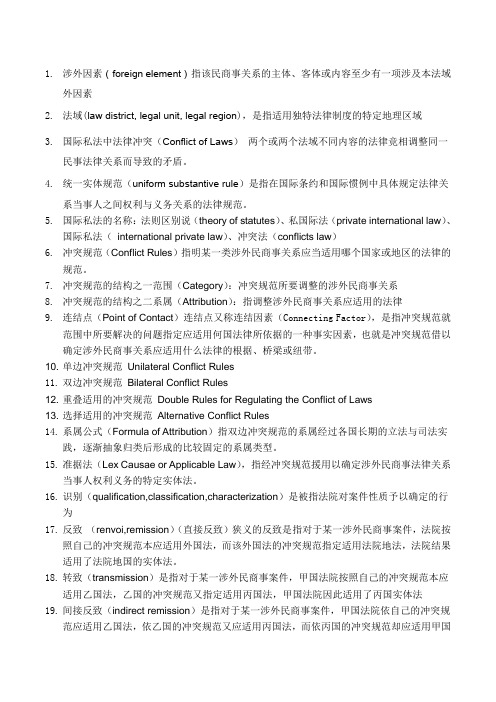
1.涉外因素(foreign element)指该民商事关系的主体、客体或内容至少有一项涉及本法域外因素2.法域(law district, legal unit, legal region),是指适用独特法律制度的特定地理区域3.国际私法中法律冲突(Conflict of Laws)两个或两个法域不同内容的法律竞相调整同一民事法律关系而导致的矛盾。
4.统一实体规范(uniform substantive rule)是指在国际条约和国际惯例中具体规定法律关系当事人之间权利与义务关系的法律规范。
5.国际私法的名称:法则区别说(theory of statutes)、私国际法(private international law)、国际私法(international private law)、冲突法(conflicts law)6.冲突规范(Conflict Rules)指明某一类涉外民商事关系应当适用哪个国家或地区的法律的规范。
7.冲突规范的结构之一范围(Category):冲突规范所要调整的涉外民商事关系8.冲突规范的结构之二系属(Attribution):指调整涉外民商事关系应适用的法律9.连结点(Point of Contact)连结点又称连结因素(Connecting Factor),是指冲突规范就范围中所要解决的问题指定应适用何国法律所依据的一种事实因素,也就是冲突规范借以确定涉外民商事关系应适用什么法律的根据、桥梁或纽带。
10.单边冲突规范Unilateral Conflict Rules11.双边冲突规范Bilateral Conflict Rules12.重叠适用的冲突规范Double Rules for Regulating the Conflict of Laws13.选择适用的冲突规范Alternative Conflict Rules14.系属公式(Formula of Attribution)指双边冲突规范的系属经过各国长期的立法与司法实践,逐渐抽象归类后形成的比较固定的系属类型。
国际法期末考试英文名词解释
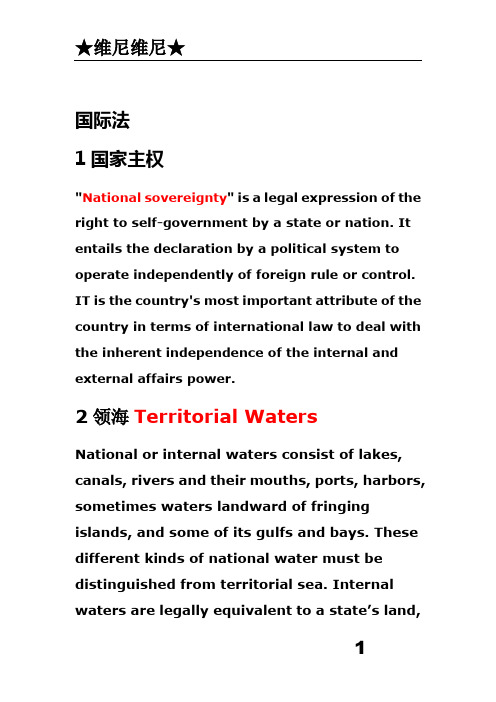
国际法1国家主权"National sovereignty" is a legal expression of the right to self-government by a state or nation. It entails the declaration by a political system to operate independently of foreign rule or control. IT is the country's most important attribute of the country in terms of international law to deal with the inherent independence of the internal and external affairs power.2领海Territorial WatersNational or internal waters consist of lakes, canals, rivers and their mouths, ports, harbors, sometimes waters landward of fringing islands, and some of its gulfs and bays. These different kinds of national water must be distinguished from territorial sea. Internal waters are legally equivalent to a state’s land,and are entirely subject to its territorial sovereignty3领土The Conception of State Territory(国家领土构想)State territory is that defined portion of the globe which is subjected to the sovereignty of a state.It is to be noticed that Antarctica and Arctic Ocean can be regarded as territory as well, although it is belong to all states rather than any one state.A wandering tribe, although it has a government and is otherwise organized, is not a state until it has settled down in the territory of its own.4无主地(英文课件)Terra nullius and Res communisTerra nullius refers to territory which can be acquired by a single state but which is not yet under the territorial sovereignty of that state.Res communis consists of territory that is not capable of being controlled by any single state5无害通过权A term of international law referring to a ship or aircraft's right to enter and pass through another's territory so long as it is not prejudicial to the peace, good order or security of the other state.6先占(英文课件)Occupation(不是职业,翻译为先占)Definition: It is defined as the state takes the territorial sovereignty of terra nullius intentionally.7民族自决权S elf-determination is thecompulsion or external interference.8条约保留(英文课件)reservation”means a unilateral statement, however phrased or named, made by a State, when signing, ratifying, accepting, approving or acceding to a treaty, whereby it purports to exclude or to modify the legal effect of certain provisions of the treaty in their application to that State;9庇护Asylum is A secure place of refuge. (貌似译为避护所为宜)(YOUR DICTIONARU)A country that accepted a person from another country that was in danger is an example of a country that gave asylum to that person.(/asylum)(维基百科)Right of asylum is an ancient juridical notion, under which a person persecuted for political opinions or religious beliefs in his or her own country may be10引渡Extradition is the official process whereby one nation or state surrenders asuspected or convicted criminal to another nation or state, usually under the terms of a extradition treaty.11国家责任(好像有)The laws of state responsibility are the principles governing whenany particular obligations, the rules of state responsibility determine, in general, when an obligation has been breached and the legal consequences of that violation简答题1国际法的渊源The Sources of International Law●Convention or Treaties: “International agreements concluded between states in written form and governed by International law, which can be bilateral or multilateral”●International Customs: “Evidence of a general practice accepted as law”●General Principles of Law as accepted by Civilized Nations ●Judicial Decisions of International courts and tribunals●The teachings of most highly qualified scholars of various nations●Resolutions of the United Nations General Assembly2国际法的基本原则(英文课件)Charter of the United Nations●1. The Organization is based on the principle of the sovereign equality of all its Members.●2.All Members, in order to ensure to all of them the rights and benefits resulting from membership, shall fulfill in good faith the obligations assumed by them in accordance with the present Charter.●3. All Members shall settle their international disputes by peaceful means in such a manner that international peace and security, and justice, are not endangered.●4. All Members shall refrain in their international relations from the threat or use of force against the territorial integrity or political independence of any state, or in any other manner inconsistent with the Purposes of the United Nations.●5. All Members shall give the United Nations every assistance in any action it takes in accordance with the present Charter, and shall refrain from giving assistance to any state against which the United Nations is taking preventive or enforcement action.●6.The Organization shall ensure that States which are not Members of the United Nations act in accordance with these Principles so far as may be necessary for the maintenance of international peace and security.●7. Nothing contained in the present Charter shall authorize the United Nations to intervene in matters which are essentially within the domestic jurisdiction of any State or shall require the Members to submit such matters to settlement under the present Charter;but this principle shall not prejudice the application of enforcement measures under Chapter VII.3人权的概念,特征和性质Definition and Characters of Human Rights Definition: Human Rights are the rights that all people have by virtue of being human beings. HUMAN RIGHTS are derived from the inherent dignity of the human person and are defined internationally, nationally and locally by various law making bodies.Characters a. Subjects: Universal and Particularb. Contents: Treaties and Customary lawc. Best manner: International Cooperation。
- 1、下载文档前请自行甄别文档内容的完整性,平台不提供额外的编辑、内容补充、找答案等附加服务。
- 2、"仅部分预览"的文档,不可在线预览部分如存在完整性等问题,可反馈申请退款(可完整预览的文档不适用该条件!)。
- 3、如文档侵犯您的权益,请联系客服反馈,我们会尽快为您处理(人工客服工作时间:9:00-18:30)。
国际法1国家主权"National sovereignty" is a legal expression of the right to self-government by a state or nation. It entails the declaration by a political system to operate independently of foreign rule or control. IT is the country's most important attribute of the country in terms of international law to deal with the inherent independence of the internal and external affairs power.2领海Territorial WatersNational or internal waters consist of lakes, canals, rivers and their mouths, ports, harbors, sometimes waters landward of fringing islands, and some of its gulfs and bays. These different kinds of national water must be distinguished from territorial sea. Internal waters are legally equivalent to a state’s land,and are entirely subject to its territorial sovereignty3领土The Conception of State Territory(国家领土构想)State territory is that defined portion of the globe which is subjected to the sovereignty of a state.It is to be noticed that Antarctica and Arctic Ocean can be regarded as territory as well, although it is belong to all states rather than any one state.A wandering tribe, although it has a government and is otherwise organized, is not a state until it has settled down in the territory of its own.4无主地(英文课件)Terra nullius and Res communisTerra nullius refers to territory which can be acquired by a single state but which is not yet under the territorial sovereignty of that state.Res communis consists of territory that is not capable of being controlled by any single state5无害通过权A term of international law referring to a ship or aircraft's right to enter and pass through another's territory so long as it is not prejudicial to the peace, good order or security of the other state.6先占(英文课件)Occupation(不是职业,翻译为先占)Definition: It is defined as the state takes the territorial sovereignty of terra nullius intentionally.7民族自决权S elf-determination is thecompulsion or external interference.8条约保留(英文课件)reservation”means a unilateral statement, however phrased or named, made by a State, when signing, ratifying, accepting, approving or acceding to a treaty, whereby it purports to exclude or to modify the legal effect of certain provisions of the treaty in their application to that State;9庇护Asylum is A secure place of refuge. (貌似译为避护所为宜)(YOUR DICTIONARU)A country that accepted a person from another country that was in danger is an example of a country that gave asylum to that person.(/asylum)(维基百科)Right of asylum is an ancient juridical notion, under which a person persecuted for political opinions or religious beliefs in his or her own country may be10引渡Extradition is the official process whereby one nation or state surrenders asuspected or convicted criminal to another nation or state, usually under the terms of a extradition treaty.11国家责任(好像有)The laws of state responsibility are the principles governing whenany particular obligations, the rules of state responsibility determine, in general, when an obligation has been breached and the legal consequences of that violation简答题1国际法的渊源The Sources of International Law●Convention or Treaties: “International agreements concluded between states in written form and governed by International law, which can be bilateral or multilateral”●International Customs: “Evidence of a general practice accepted as law”●General Principles of Law as accepted by Civilized Nations ●Judicial Decisions of International courts and tribunals●The teachings of most highly qualified scholars of various nations●Resolutions of the United Nations General Assembly2国际法的基本原则(英文课件)Charter of the United Nations●1. The Organization is based on the principle of the sovereign equality of all its Members.●2.All Members, in order to ensure to all of them the rights and benefits resulting from membership, shall fulfill in good faith the obligations assumed by them in accordance with the present Charter.●3. All Members shall settle their international disputes by peaceful means in such a manner that international peace and security, and justice, are not endangered.●4. All Members shall refrain in their international relations from the threat or use of force against the territorial integrity or political independence of any state, or in any other manner inconsistent with the Purposes of the United Nations.●5. All Members shall give the United Nations every assistance in any action it takes in accordance with the present Charter, and shall refrain from giving assistance to any state against which the United Nations is taking preventive or enforcement action.●6.The Organization shall ensure that States which are not Members of the United Nations act in accordance with these Principles so far as may be necessary for the maintenance of international peace and security.●7. Nothing contained in the present Charter shall authorize the United Nations to intervene in matters which are essentially within the domestic jurisdiction of any State or shall require the Members to submit such matters to settlement under the present Charter;but this principle shall not prejudice the application of enforcement measures under Chapter VII.3人权的概念,特征和性质Definition and Characters of Human Rights Definition: Human Rights are the rights that all people have by virtue of being human beings. HUMAN RIGHTS are derived from the inherent dignity of the human person and are defined internationally, nationally and locally by various law making bodies.Characters a. Subjects: Universal and Particularb. Contents: Treaties and Customary lawc. Best manner: International Cooperation。
